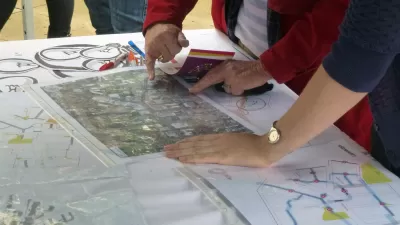While streamlining and anti-NIMBYism are in vogue, Murtaza Baxamusa reminds us what's really at stake.
One person’s certainty is another’s uncertainty. If development projects, especially large developments, attain more certainty through cutting back the administrative and public review process, the result is more uncertainty for impacted neighborhoods and others, warns USC urban planning faculty member and affordable housing developer Murtaza Baxamusa, Ph.D, AICP.
“[T]here is a concerted effort by planners and policymakers locally and statewide, to reduce uncertainty in development project approvals. It takes the form of reducing discretion of public bodies, streamlining permit approvals through the use of specific plans and categorical exemptions, reforming the California Environmental Quality Act, and limiting opportunities for legal challenges to projects.
However, what often occurs under the guise of reducing uncertainty for project proponents is shifting that uncertainty to the many other stakeholders in a project. These stakeholders include elected officials, other regulatory agencies, neighbors, construction suppliers, contractors and building trades, organized labor, community planning groups, neighborhood associations, future residents, future local workforce, nonprofit service providers, and everyone downstream on the environmental impacts of the project.
This shift occurs because there is a cloud of externalities that hovers over most projects, which mushrooms with the scale of the project. These externalities include impacts on regional employment dynamics, increased load on existing infrastructure, stress on the jobs-housing balance, higher utilization of neighborhood services and public safety, disempowerment of minorities, deficiency of strained community amenities and facilities, burden on sensitive receptors within the radius of influence of the project, destruction of historical heritage, industrial waste and toxic emissions, consumption of natural resources, congestion and pollution from automobiles that drive to and from the project, as well as cumulative impacts of growth such as greenhouse gas emissions.”
FULL STORY: In Defense of Uncertainty

Alabama: Trump Terminates Settlements for Black Communities Harmed By Raw Sewage
Trump deemed the landmark civil rights agreement “illegal DEI and environmental justice policy.”

Study: Maui’s Plan to Convert Vacation Rentals to Long-Term Housing Could Cause Nearly $1 Billion Economic Loss
The plan would reduce visitor accommodation by 25% resulting in 1,900 jobs lost.

Planetizen Federal Action Tracker
A weekly monitor of how Trump’s orders and actions are impacting planners and planning in America.

Wind Energy on the Rise Despite Federal Policy Reversal
The Trump administration is revoking federal support for renewable energy, but demand for new projects continues unabated.

Passengers Flock to Caltrain After Electrification
The new electric trains are running faster and more reliably, leading to strong ridership growth on the Bay Area rail system.

Texas Churches Rally Behind ‘Yes in God’s Back Yard’ Legislation
Religious leaders want the state to reduce zoning regulations to streamline leasing church-owned land to housing developers.
Urban Design for Planners 1: Software Tools
This six-course series explores essential urban design concepts using open source software and equips planners with the tools they need to participate fully in the urban design process.
Planning for Universal Design
Learn the tools for implementing Universal Design in planning regulations.
Caltrans
Smith Gee Studio
Institute for Housing and Urban Development Studies (IHS)
City of Grandview
Harvard GSD Executive Education
Toledo-Lucas County Plan Commissions
Salt Lake City
NYU Wagner Graduate School of Public Service





























